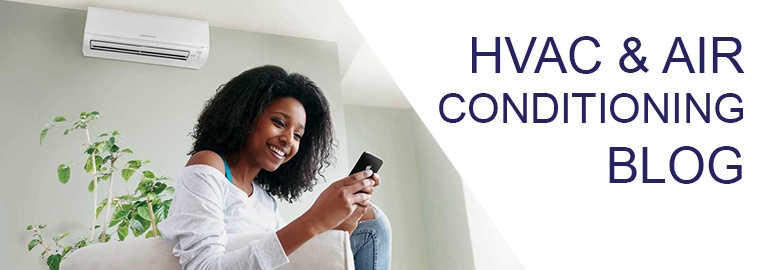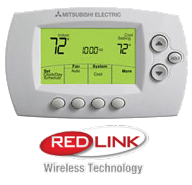
Everything you wanted to know about Air Conditioning
HVAC (Heating - Ventilation - Air Conditioning) can sometimes be overwhelming. Here we'll break down some of the most commonly used terms in the business, so the next time you call your heating and air conditioning service specialist for help, you'll impress the expert!
Air Conditioning, HVAC for Dummies
-
Air conditioner: A mechanical device used to control temperature and air movement in a confined space.
-
BTU/H: (British Thermal Units per Hour): A measure of cooling or heating capacity.
-
Capacity or Load: A refrigeration rating system usually measured in Btu/h.
-
Compressor: A refrigeration or air-conditioning system pump that circulates refrigerant through pipes between an outdoor and indoor unit using pressure.
- Ductless Mini-Split: Ductless systems consist of one or more outdoor compressor units and indoor air-handling units, called “heads”, linked by a dedicated refrigerant line. There is no ductwork required.
-
External Static Pressure (ESP): Measure of static pressure losses from ductwork, fittings, dampers, grills, and any other devices located in the airstream.
- Freon: See Refrigerant.
-
Heat pump: An air conditioning system that provides either heating or cooling - because it can reverse the direction of refrigerant flow.
-
HSPF (Heating Season Performance Factor): A rating of the seasonal efficiency of a heat pump unit when operating in the heating mode.
-
Indoor unit: The air handler of the air conditioning system. It contains a heat exchange coil, filters, remote signal receiver and fan.
-
Outdoor Unit: A component of the air conditioning system which contains the compressor, fan, circuit board, and heat exchange coil. It pumps refrigerant to or from the indoor unit.
-
Refrigerant: Many people commonly refer to refrigerant as Freon, which is actually a 'brand' name (much like Kleenex). Refrigerant is a gas/liquid substance that is used to provide cooling, by direct absorption of heat. The most environmentally-friendly refrigerant at this time is R410A.
-
Refrigerant lines: Insulated copper tubing through which refrigerant flows to and from the indoor and outdoor unit.
-
SEER (Seasonal Energy Efficiency Ratio): The rating of the seasonal efficiency of air conditioning or heating units. The higher the SEER, the more energy efficient the unit is.
-
Split-Ductless System: A system comprised of a remote outdoor condensing unit connected by refrigerant pipes to a matching, non-ducted indoor air handler and a remote controller. Special cases for introducing ventilated air may call for limited ducting to air handler from outside.
-
Split-zoning System: A system comprised of a remote outdoor condensing unit connected by refrigerant pipes to a matching, indoor air handler that conditions single or multiple room space that is conditioned to a set temperature and is independent from other rooms within the same structure.
-
Zone (zoning): A single or multiple room space that is conditioned to a set temperature and is independent from other rooms within the same structure.
A trained and licensed HVAC contractor can help you determine the appropriate options for your home's air conditioning. For more information, contact the Total Comfort Mechanical Heating and Air Conditioning Service website or call us at (781) 697-9016.
This entry was tagged AC, Tips, Heating, Air Conditioning, MiniSplit and posted on July 21, 2016
Save money on your summer energy bill with these HVAC Tips
Did you know that about half of the energy consumed in the United States is for heating and cooling alone?
Keeping your Massachusetts home air-conditioned and comfortable can be expensive, especially when everyone is trying to beat the sweltering summer heat and energy consumption is high. The good news is there are actually some very simple things you can do to stay cool without having to empty your wallet for energy bills!
1) Don’t forget the Filter
This is one of the easiest things to do yet one of the most commonly overlooked. Filters should be replaced regularly, so make it a habit by keeping a supply of filters on hand. Actually, the number one reason for HVAC system failure is dirt. Properly maintained equipment lasts longer and keeps the system running more efficiently. Filters should be changed every:
- 3 months on a 1" pleated filter
- 6 months on a 5" media air cleaner
It's also helpful to invest in a HVAC Maintenance plan, as many include free filter changes with membership.
2) Get in the Shade
Burlington MA is located in the "temperate" area on the US Dept. of Energy's climate region map. Unlike the hot and arid Southwest and hot and humid Southeast, energy-saving landscaping strategies for this area must be balanced - keeping heat out in summer and keeping it in during winter months.
Adding more trees and bushes to your home's exterior not only provides a more beautiful landscape, but can considerably block the amount of solar heat beaming on the roof and through the windows. All that heat makes your air conditioning system work harder. Strategically place vegetation so that it shades the roof, east and west facing walls.
If the outdoor air conditioning unit itself receives some shading from trees and shrubbery, it can also improve your HVAC system effectiveness up to 10%!
3) Upgrade your Thermostat
 If you are reading this article on a smartphone and you don’t have a digital programmable thermostat yet, you should be embarrassed! Advanced technology can help you save energy and reduces costs by giving you precise control over temperature, humidity, air treatment, scheduling and more.
If you are reading this article on a smartphone and you don’t have a digital programmable thermostat yet, you should be embarrassed! Advanced technology can help you save energy and reduces costs by giving you precise control over temperature, humidity, air treatment, scheduling and more.
Smart and relatively inexpensive, Digital Programmable Thermostats allow you to adjust the settings for a higher temperature when no one's home or during cooler parts of the day.
On the go and want to change the settings? You can even connect to your system from almost anywhere via Wi-Fi.
4) Turn off ceiling fans when not in use
Keeping a ceiling fan running all the time, even when the room is unoccupied really doesn’t keep the room cooler. Though they do help circulate air, ceiling fans have no effect on the temperature of the area. They simply redistribute already conditioned (or unconditioned) air and make it feel cooler because it's creating a breeze against your body. Prevent wasted electricity by turning them off when leaving a room.
5) Go Underground
Naturally cooler than the rest of the home, a basement can provide instant relief on a hot day. If your home has a basement, why not convert it into a summer family room or hangout?
Be sure to keep basement windows and doors closed during steamy summer weather to avoid excess condensation which increases indoor humidity. Humidity levels however can be controlled with a number of whole-home humidity control solutions that are designed to work together to use energy as efficiently as possible.
6) Make sure vents are clean and open
It may be obvious but it is truly remarkable what you may not notice about your own home. Vents can be accidentally shut for cleaning purposes and never reopened. If you notice an unusually warm room or area in your home, don’t forget to check the vent.
7) Replace old air conditioning units with newer, efficient models
 If you have an older unit that has not been properly maintained, investing in a new and more energy-efficient model. The replacement costs are well worth it in the long run. See this guide to determine if you should repair or replace your heating and cooling system.
If you have an older unit that has not been properly maintained, investing in a new and more energy-efficient model. The replacement costs are well worth it in the long run. See this guide to determine if you should repair or replace your heating and cooling system.
When you’re faced with the choice between replacing and repairing part or all of your heating and cooling system, rely on a trusted HVAC contractor like Total Comfort Mechanical to help you find a solution that’s affordable, keeps your family comfortable and makes sense in the long-term.
8) Get a Tune-up!
Regular maintenance allows minor repairs to be caught before they become major, costly replacements. To be absolutely certain you are obtaining optimal efficiency from your home's central air conditioning system, schedule an AC tune-up. This includes a check of multiple factors to ensure all air conditioning system components are operating properly and that the system is meeting the manufacturer’s expectations for efficiency. Failing parts can be identified in advance to prevent unexpected equipment breakdown.
This entry was tagged Energy Efficiency, AC, Tips, Air Conditioning, Energy Star, Energy bill, HVAC and posted on June 03, 2016
Everything you wanted to know about Air Conditioning
HVAC (Heating - Ventilation - Air Conditioning) can sometimes be overwhelming. Here we'll break down some of the most commonly used terms in the business, so the next time you call your heating and air conditioning service specialist for help, you'll impress the expert!
Air Conditioning, HVAC for Dummies
-
Air conditioner: A mechanical device used to control temperature and air movement in a confined space.
-
BTU/H: (British Thermal Units per Hour): A measure of cooling or heating capacity.
-
Capacity or Load: A refrigeration rating system usually measured in Btu/h.
-
Compressor: A refrigeration or air-conditioning system pump that circulates refrigerant through pipes between an outdoor and indoor unit using pressure.
- Ductless Mini-Split: Ductless systems consist of one or more outdoor compressor units and indoor air-handling units, called “heads”, linked by a dedicated refrigerant line. There is no ductwork required.
-
External Static Pressure (ESP): Measure of static pressure losses from ductwork, fittings, dampers, grills, and any other devices located in the airstream.
- Freon: See Refrigerant.
-
Heat pump: An air conditioning system that provides either heating or cooling - because it can reverse the direction of refrigerant flow.
-
HSPF (Heating Season Performance Factor): A rating of the seasonal efficiency of a heat pump unit when operating in the heating mode.
-
Indoor unit: The air handler of the air conditioning system. It contains a heat exchange coil, filters, remote signal receiver and fan.
-
Outdoor Unit: A component of the air conditioning system which contains the compressor, fan, circuit board, and heat exchange coil. It pumps refrigerant to or from the indoor unit.
-
Refrigerant: Many people commonly refer to refrigerant as Freon, which is actually a 'brand' name (much like Kleenex). Refrigerant is a gas/liquid substance that is used to provide cooling, by direct absorption of heat. The most environmentally-friendly refrigerant at this time is R410A.
-
Refrigerant lines: Insulated copper tubing through which refrigerant flows to and from the indoor and outdoor unit.
-
SEER (Seasonal Energy Efficiency Ratio): The rating of the seasonal efficiency of air conditioning or heating units. The higher the SEER, the more energy efficient the unit is.
-
Split-Ductless System: A system comprised of a remote outdoor condensing unit connected by refrigerant pipes to a matching, non-ducted indoor air handler and a remote controller. Special cases for introducing ventilated air may call for limited ducting to air handler from outside.
-
Split-zoning System: A system comprised of a remote outdoor condensing unit connected by refrigerant pipes to a matching, indoor air handler that conditions single or multiple room space that is conditioned to a set temperature and is independent from other rooms within the same structure.
-
Zone (zoning): A single or multiple room space that is conditioned to a set temperature and is independent from other rooms within the same structure.
A trained and licensed HVAC contractor can help you determine the appropriate options for your home's air conditioning. For more information, contact the Total Comfort Mechanical Heating and Air Conditioning Service website or call us at (781) 697-9016.
This entry was tagged AC, Ductless, Tips, Heating, Air Conditioning, MiniSplit and posted on August 29, 2014

Turn off ceiling fans when not in use
Some people believe that keeping a ceiling fan running all the time, even when the room is unoccupied, will keep the room cooler than if turned off. While they do help circulate air, ceiling fans have no effect on the temperature of the area. They simply redistribute already conditioned (or unconditioned) air and make it feel cooler because it's creating a breeze against your body. Leaving the fan on while the room is empty will not make the room any cooler upon your return. Turn them off when leaving a room to prevent wasted electricity.
Go Green (and not the way you're thinking, either)
We're talking actual green in color - whatever shades appeal to you : forest green, emerald green, moss or fir. Adding more trees and bushes to your home's exterior not only provides a more beautiful landscape, but can considerably block the amount of solar heat beaming on the roof and through the windows. All that heat makes your air conditioning system work harder. In addition, if the air conditioning unit itself receives shading from trees or shrubbery, it can improve your AC's effectiveness up to ten percent!
Massachusetts lies in the "temperate" area on the US Dept. of Energy's climate region map. Unlike the hot and arid Southwest and hot and humid Southeast, energy-saving landscaping strategies for this area must be balanced - keeping heat out in summer and keeping it in during winter months (see more at Landscape for Life).
Get with the Program...
...with a digital programmable thermostat (DPT)! Smart and relatively inexpensive, DPT's allow you to adjust the settings for a higher temperature when no one's home or during cooler parts of the day. With today's technologically-advanced controls you can truly set it and forget it, and even manage your home's central air conditioning system via mobile device. (Side note to self: if you're reading this article on a smartphone and you still don't have a digital t-stat yet, you should be embarrassed.)
Chill Out Down Under
If your home has a basement, why not convert it into a summer family room or hangout? Naturally cooler than the rest of the home, the basement can provide instant relief on a hot day. Be careful about opening basement windows though, especially during very hot and humid weather. Damp, tropical air can cause surface condensation which will increase indoor humidity as well.
To be absolutely certain you are obtaining optimal efficiency from your home's A/C system, schedule a system maintenance check with us. We will check multiple factors to ensure all air conditioning system components are operating properly, that the system is meeting the manufacturer’s expectations for efficiency, and recommend alternatives if not.
This entry was tagged Burlington MA, Tips, Energy, MA, Efficiency, Air Conditioning, Massachusetts, Keep Cool, Energy bill and posted on July 18, 2014
How to keep your central air conditioning system running efficiently
Our customers and subscribers have asked for suggestions on how to reduce the energy costs associated with home cooling during the summer months. To help, we’ve compiled this list for easy reference, and to easily share with friends and family, too!
Looking for ways to beat the heat? July has been a scorcher in Burlington, and neighboring Massachusetts areas it looks like August will bring more of the same.
Try these tips to keep your air conditioning system running efficiently:
- Replace filters regularly! This is one of the easiest things to do yet one of the most commonly overlooked. Filters should be replaced monthly, so make it a habit by keeping a supply of filters on hand.
- Set your thermostat and leave it. Pick a temperature that you are comfortable with (perhaps 75°) and keep it at a constant setting. Turning the thermostat down doesn’t affect the temperature of the air blowing out of your vents. It makes the system run longer, not colder.
- Keep curtains, drapes and blinds closed, especially on the west-facing side of your house.
- Shade your air conditioner. Your unit works harder if it is in an area that receives full sun.
- Don’t block the AC unit. Keep air flow free from obstructions.
- Keep household appliances that produce heat far away from your thermostat. You don’t want an adjacent TV or water heater to contribute to a false thermostat temperature.
- Caulk around window frames to seal any leaks and check weather stripping.
- Invest in a few good ceiling fans or some smaller portable fans. Fans provide evaporative cooling as you sweat. If you buy a ceiling fan with lights, opt for those with Compact Fluorescent Lamps (pin-type) CFL’s, which last up to 15 times as long as incandescent bulbs.
- If your home has a fireplace, don’t send cool air up the chimney – close the damper and shut glass doors.
- Schedule regular service on your air conditioning system. Your system’s refrigerant charge needs to be checked annually, and the AC unit needs to be cleaned professionally. A/C Maintenance ensures your system is running at peak efficiency.
If you are concerned about obtaining optimal efficiency from your Air Conditioning system, be sure to schedule an A/C system maintenance check with your HVAC contractor. A professional will check multiple factors to ensure all air conditioning system components are operating properly, and that the system is meeting the manufacturer’s expectations for efficiency.
This entry was tagged AC, Burlington MA, Tips, Efficiency, Air Conditioning, Air Conditioner, Keep Cool, Energy bill and posted on August 02, 2013
Archives
- December 2013 (2)
- December 2016 (2)
- May 2013 (1)
- June 2013 (1)
- August 2013 (1)
- October 2013 (1)
- February 2014 (1)
- April 2014 (1)
- July 2014 (1)
- August 2014 (1)
- December 2014 (1)
- March 2015 (1)
- April 2015 (1)
- January 2016 (1)
- February 2016 (1)
- April 2016 (1)
- June 2016 (1)
- July 2016 (1)
- January 2017 (1)
- January 2018 (1)
- January 2019 (1)
- February 2019 (1)
- January 2020 (1)
Posts by Tags
- Air Conditioning (18)
- Heating (10)
- AC (9)
- Burlington MA (8)
- MiniSplit (8)
- HVAC (7)
- Heat (6)
- Heating contractor (6)
- MA (6)
- Ductless (5)
- Ductless AC (5)
- Energy (5)
- Energy Efficiency (5)
- Heat Pumps (5)
- Massachusetts (5)
- Tips (5)
- Air Conditioner (4)
- Award (4)
- Energy bill (4)
- Angie;s List (3)
- Efficiency (3)
- Energy Rebates (3)
- Energy Star (3)
- Furnace (3)
- Mitsubishi (3)
- Mitsubishi AC (3)
- Reviews (3)
- Keep Cool (2)
- Cooling (1)
- ERV (1)
- Energy Tax Credit (1)
- Humidifiers (1)
- IAQ (1)
- Indoor Air Quality, (1)
- Lexington MA (1)
- Pumps (1)
- Recycling (1)
- Replacement (1)
- Storm (1)
- Ventilation (1)
- Winter (1)






